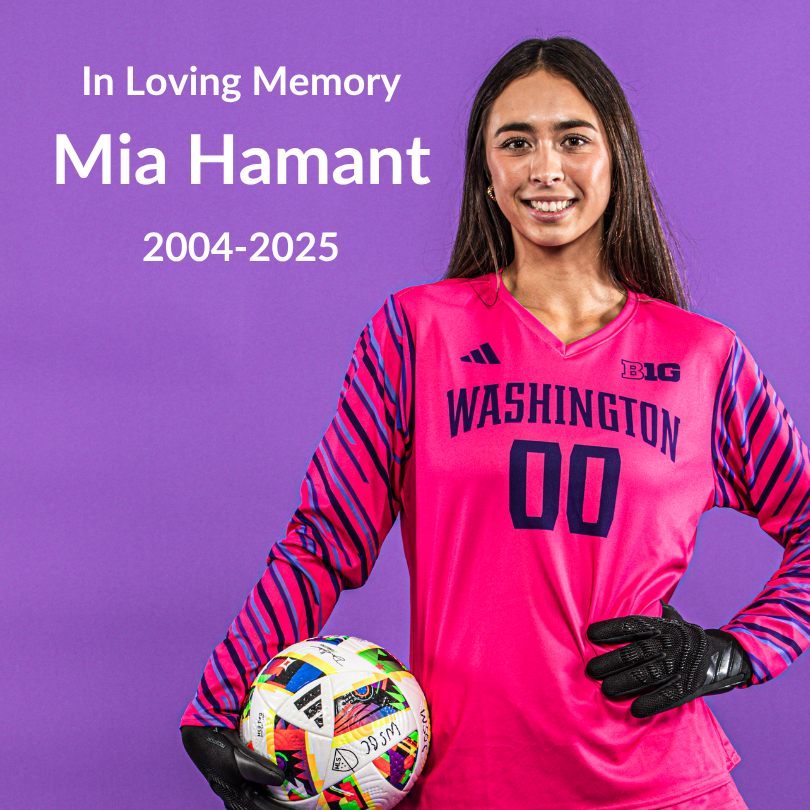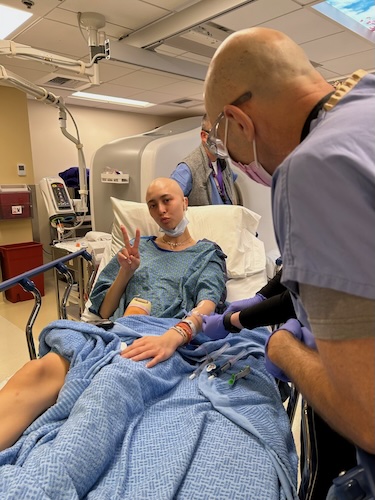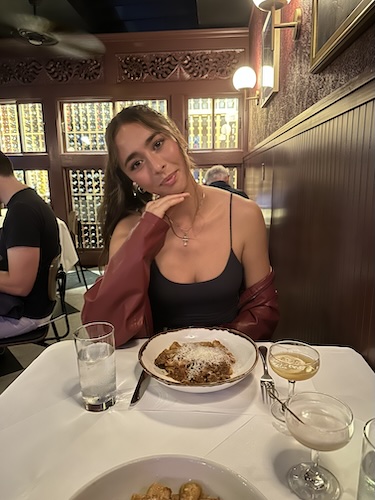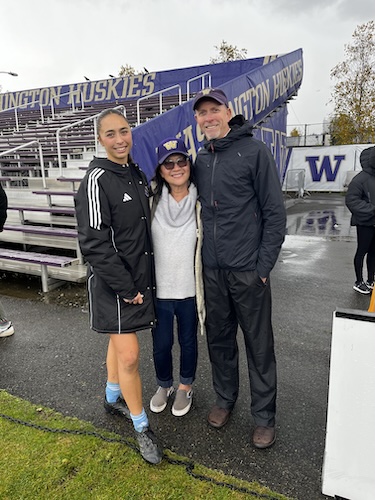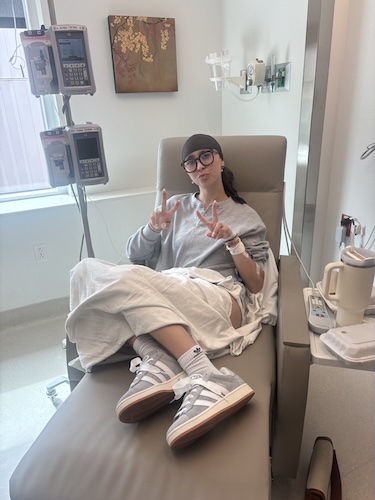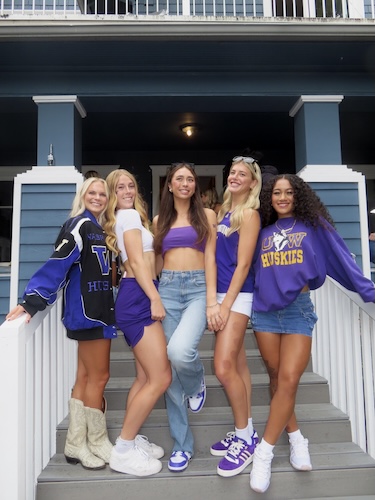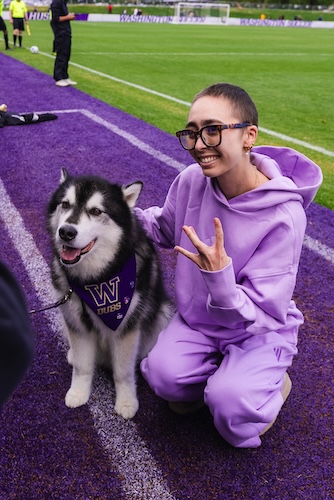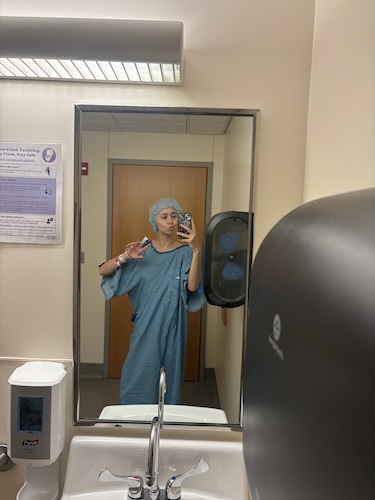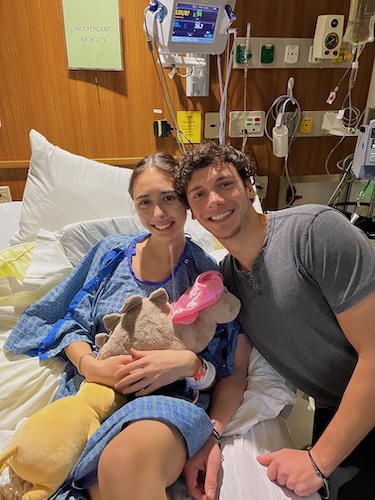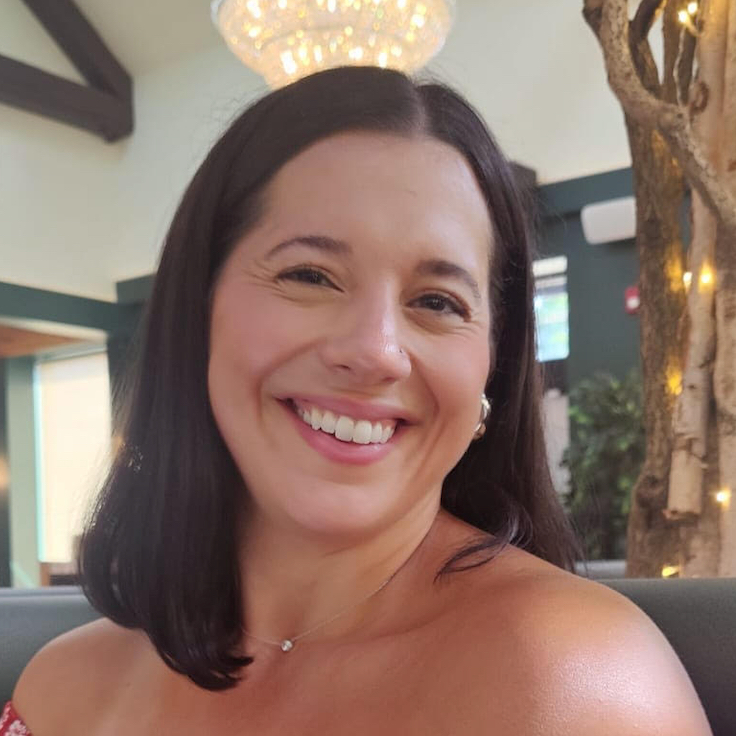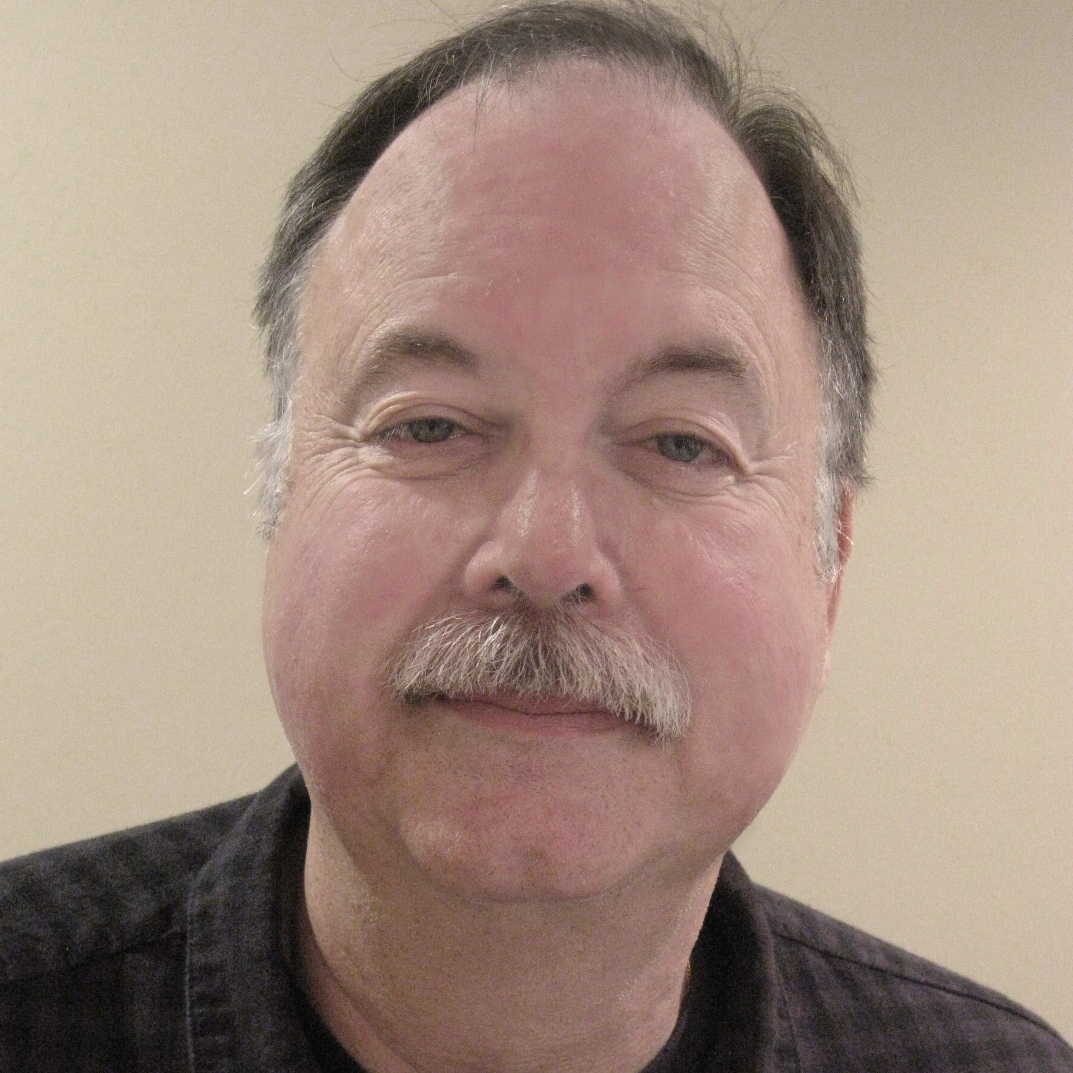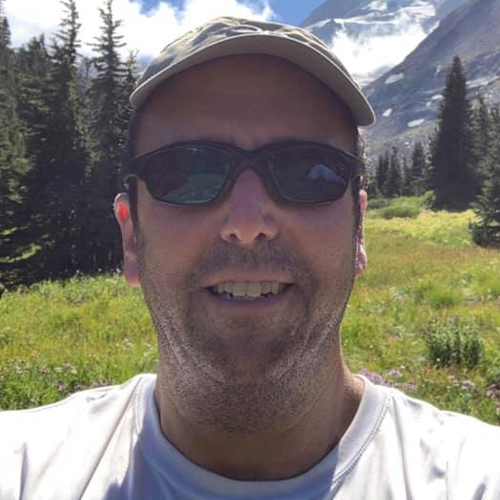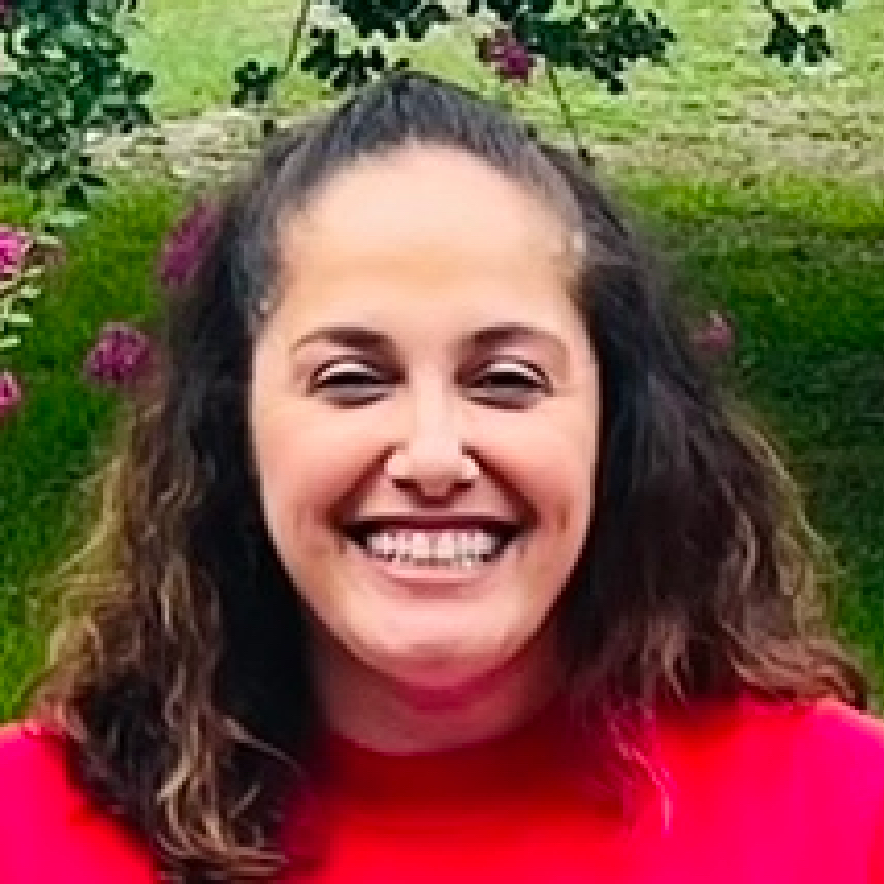A Life Defined by Strength, Hope, and Community: Mia Hamant’s Stage 4 Kidney Cancer Story
In memory of Mia Hamant, who passed away after battling stage 4 kidney cancer at age 21.
This interview with Mia Hamant was recorded on October 15, 2025, just three weeks before her passing. When we spoke, Mia was full of determination and hope. She wanted to share her experience to help others understand what it means to face a rare and aggressive cancer at such a young age.
In Loving Memory of Mia
(2004-2025)
Interviewed by: Nikki Murphy
Edited by: Chris Sanchez & Jeff Forslund
Mia was a goalkeeper for the University of Washington women’s soccer team, a psychology major, a loyal friend, loving daughter, and a fighter who approached every challenge with courage and grace. As Mia’s disease progressed, she was planning for her next steps including rebuilding her strength and pursuing clinical trials.
We release this video in her memory, with deep gratitude to Mia and her family for allowing her story to be shared. We hope you’ll listen to her words as she meant them. Her message is one of honesty, strength, and love for life, even in the hardest moments.
A goalkeeper for the University of Washington, Mia described symptoms that first masked as stress and travel-related illness, until scans and pathology uncovered a rare, aggressive kind of kidney cancer, associated with a mutation in the SMARCB1 gene, that demanded urgent action. She made a personal choice to limit some of the cancer details she wanted to be told. Maintaining uncertainty, she says, preserved hope and kept her focused on the next step.
Join Us in Honoring Mia: Share Your Thoughts and Encouragement on YouTube
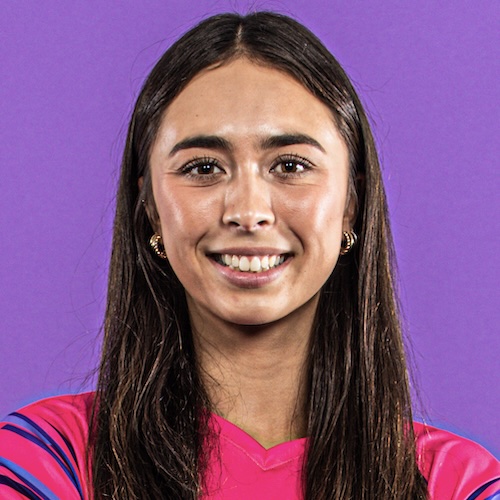
Treatment started immediately with inpatient chemotherapy. Over time, her plan included cycles of chemo, spot radiation for pain (including back radiation to relieve leg pain), and a trial of immunotherapy that worsened the disease; something Mia framed as the treatment’s effect and the cancer’s response. Side effects such as nausea, pain flares, and chemo‑induced enteritis requiring hospitalization shaped her daily life. Hair loss was more manageable emotionally, eased by support from family, friends, and her boyfriend.
What helped Mia most was community. The UW Women’s Soccer program, coaches, classmates, and even a local coffee stand rallied around her. They posted signs, organized and contributed to fundraisers, and insisted that she remained part of the team. This close community kept her feeling grounded. She centered herself with routine to help her feel normal. She celebrated her birthday and asked friends to share everyday “drama.”
She continued school online and was aiming to graduate this coming year. With placing her dream of joining the National Women’s Soccer League (NWSL) on hold, she was focused on rebuilding her body and had pursued a second‑opinion visit at MD Anderson to explore clinical trials for her rare cancer. The lesson she carries forward is to follow one’s own process with the care team, because each experience with cancer is deeply personal, and the right path is the one that fits the person, not the statistics.
Watch Mia’s video and read through the transcript of her interview below. You’ll learn more about:
- The importance of following your own process: decide how much information you want and communicate that clearly to your care team
- How treatment paths can shift; if a therapy worsens a disease like kidney cancer or side effects are overwhelming, teams can adjust plans
- How community matters: teammates, friends, family, and local supporters can make daily life and treatment feel more manageable
- Transformation: You’ll see how Mia moved from shock and uncertainty to agency, advocating for timelines, exploring second opinions, and redefining “normal”
- There is no one “right” way to navigate a cancer experience; the best approach is the one aligned with your values and needs
- Name: Mia H.
- Age at Diagnosis:
- 21
- Diagnosis:
- Kidney Cancer (SMARCB1-Deficient Renal Cell Carcinoma, Non-Sickle Cell Trait)
- Staging:
- Stage 4
- Mutation:
- SMARCB1
- Symptoms:
- Bad cough
- Fatigue
- Nausea
- Treatments:
- Chemotherapy
- Radiation
- Immunotherapy
This interview has been edited for clarity and length. This is not medical advice. Please consult with your healthcare provider to make informed treatment decisions.
The views and opinions expressed in this interview do not necessarily reflect those of The Patient Story.
- My name is Mia
- My soccer career and athletic background
- The first signs that something wasn't right
- My path to my kidney cancer diagnosis
- Getting the official diagnosis
- Learning about my stage and prognosis
- Determining my treatment plan
- Getting a second opinion
- My treatment journey
- Managing side effects
- Dealing with hair loss
- My current treatment plan
- Managing my diagnosis while being young
- Balancing school and treatment
- Finding support during treatment
- Finding normalcy as a 21-year-old
- What hope means to me moving forward
- What I feel I've been robbed of
- My message to others
Editor Note: This interview with Mia Hamant was recorded on October 15, 2025, just three weeks before her passing.
My name is Mia
I have stage four kidney cancer, specifically SMARCB1-deficient renal cell carcinoma. I got diagnosed in 2025.
I am a senior now at the University of Washington. I have been on the women’s soccer team for all four years. In my first year, I tore my ACL, so I redshirted. But aside from that, it’s been pretty smooth sailing, except for this cancer diagnosis, of course.
I’m a psychology major, and I want to be a therapist after college.
My soccer career and athletic background
I’m a goalkeeper, which a lot of people think is the craziest thing ever. But I really love it. I started playing when I was around three years old, just doing little camps and whatnot, just getting touches on the ball. I also played basketball, softball, and volleyball growing up, which all helped me become the soccer player I am today.
I started with a 50% scholarship, and then I increased my scholarship. After playing last year and performing well, my coach upped my scholarship to a full ride.
The first signs that something wasn’t right
Things didn’t feel right for a pretty long time, honestly. I started feeling a little ill at the end of last year, so I would say at around November or so, things started heading downhill, but that was during soccer season. So I chalked it up to stress, because we were traveling so much around the country, and there was just a lot going on.
But the first symptom I realized I had was intense lethargy. So I was super tired, and my workouts just weren’t doing well. Usually, I could pump myself up, get myself going. But it wasn’t like that at all. So I was pretty tired. And then my breathing started getting pretty bad. So I was really short of breath. I am short of breath right now, too, because there’s fluid getting in my lungs and whatnot.
At the end of March, we were on a team trip in Spain, which was super cool, a great experience. But I got really sick during that trip, and I was throwing up and stuff. And I was thinking, “This is not normal. This doesn’t feel right.” But I also thought it was due to the food, or the travel, or something.
I got back to the States at the beginning of April, and then that’s when I went to the ER for the first time because of shortness of breath in the morning. And then I was told that it could be one of three things: an autoimmune disease, an infection, or cancer. So that’s when I discovered that I could have cancer. And then a few days later, I was diagnosed.
My path to my kidney cancer diagnosis
I had every single scan in the book. I was just there with so many different doctors just coming in and out. I was just a medical anomaly.
I finally got admitted to the hospital after they ran a biopsy, which confirmed the diagnosis. They drained my lungs and got some samples from that, and also did a liver biopsy. This allowed them to diagnose me on April 11th when I was admitted to the hospital.
I honestly can’t even remember what happened at this point. There was just so much going on in that short time span. I think they just wanted to double-check and really get that biopsy going to make sure we knew the right diagnosis.
I think they were just seeing a bunch of lesions everywhere, all over my body, because I got diagnosed pretty late, so it was stage 4. So there’s just a bunch of lesions all over my body. And I’m pretty sure that’s what made them decide.
Getting the official diagnosis
We laugh about this now, but when I found out, I was alone. My mom was in the hospital with me, but she was taking a work phone call, and I wanted to figure out what my diagnosis was on my own. But the doctor came in, and I feel so bad for this guy. He has a daughter my age. And he had to break the news to me, and I just started bawling my eyes out. And then my mom comes in and goes, “Why would you tell her without me?” It was a whole scene. It wasn’t a huge deal, but it was just funny to look back at. We joke about it now.
I just remember I was so shocked. I just had no idea what that diagnosis came with. So I was just out of it for a while. But eventually I got my bearings, and I really just put my mind to it and thought, “Okay, this is actually happening.” But for the first part, I was super out of it and just bawling my eyes out.
I’ve got no family history of cancer at all. I’m missing a certain gene that allows me to fight this cancer.
Learning about my stage and prognosis
I actually didn’t know for the longest time that I was at stage 4, because I didn’t want to know any details about it, even how long I have to live or whatever. I hate knowing those details. So I actually kept it under wraps for a while, and I found out through my GoFundMe page once it was posted that I had stage 4 cancer.
It is an ignorance-is-bliss type of situation, and I really appreciate the way that the doctors and I went about it, because I think it made my process a lot easier and more manageable for me to comprehend.
Determining my treatment plan
Honestly, that was a blur, too. But I think we immediately decided to start chemo because of the state of my body. It was hard for me to breathe, hard for me to move, to do all these things. So we immediately decided to start treatment no matter what.
I wanted to get some cold caps and stuff for hair loss, but there was just no time for that. There’s a bunch of other things with fertility and stuff that I was hoping to get done, but I couldn’t wait any longer for that either. So it was a whirlwind.
I did end up getting my first treatment of chemo in the hospital when I was admitted. So the doctors did a really good job of just getting that started and getting the ball rolling. There are definitely other ways I feel I could have gone about it, but timing-wise, it was very difficult.
Getting a second opinion
We did not initially get one, I just went with the original recommendation. We did get a second opinion recently in Houston, Texas, at MD Anderson. After that visit, I found there are clinical trials I could possibly join. My disease is rare, so we want to look at all options.
My treatment journey
I’ve done a bunch of treatments so far.
I started with chemo. I did three rounds of chemo. My schedule, my regimen, is every three weeks. I go in once every week, and then I have the fourth week off. So it’s a four-week cycle. I think I did that 2 or 3 times.
We tried to get off of chemo to try immunotherapy, but that didn’t work for me at all. My body did not respond to that very well, and I started getting pain flare-ups and all this other stuff. The immunotherapy actually made my cancer worse. That was a little bit of a setback. So we went back to chemo.
I’ve also been doing radiation to treat spot areas for pain, on my back, to help with pain in my legs. And what I’ve learned is that everything’s connected in your body, obviously.I had my first radiation session around the 5th of July. And then I’ve gotten radiation three times total. That was the first time, and then two times recently. But I’m still just doing chemo. I did take a little break, but now we’re back up to the cycle again.
Managing side effects
I’ve had tons of side effects, especially right now. I can’t even list them all.
Nausea is a big one. It makes it really hard for me to eat. What I recommend for that one is just whatever sounds good, just get it and eat it. That’s all I’ve been doing recently. DoorDash has been my best friend.
Then I’ve had pain flare-ups. I had a really bad one last night that comes along with radiation, which is super unfortunate because you can’t really do anything about it. My left leg was just in so much pain last night, and I just had to tough it out.
I had to be hospitalized for chemo-induced enteritis, which is inflammation of the small intestine. So I was just in so much pain that I had to get an ambulance. It was crazy.
Dealing with hair loss
When I first shaved my head, I was totally fine. I actually had to shave my head the other day again, because hair was falling out again because of chemo. But when I first shaved it, my family, one of my best friends, and my boyfriend were there with me. So it made it very easy to just get in the flow and just have fun with it, which I really appreciated because that could be a very emotional process.
But for me, I thought it was just a sign, just taking the next step now. “Now I’m a real cancer patient.” That’s literally how I felt.
Honestly, hair loss hasn’t really bothered me at all. I was told I have a good head shape, so that also helps. But yeah, it’s not really a big deal for me.
My current treatment plan
Well, we’re stopping radiation now because I just did another cycle. So last week was really tough because I did radiation and chemo, which I haven’t done before, combined therapies. So that was really, really tough on my body. And just the eating was very difficult, and the nausea was really awful. But now we’re just doing chemo from now on.
As I mentioned, I went to MD Anderson, and they have clinical trials that I could potentially try. I’m not sure about the exact details, but we’re working on those, especially since my disease is so rare that we really want to see all the options we possibly can.
Managing my diagnosis while being young
Definitely taking a break from soccer. I still try to make all the events. I try to make every single soccer game that I can for U-Dub because I want to be there for my team, and because my team’s always here for me.
That’s the saddest part, honestly, not being able to play with my best friends. Last year, I would say was my breakout season. So I was able to get a lot of playing time then and just really prove to not only my coaches, but to myself and my teammates that I do have what it takes to play at that level. And I did want to go pro eventually, but that has been stopped. That has been put on hold. So yeah, it is weighing on me a little bit, but the fact that I’m still able to be such a part of the team has truly helped a lot. My team has done so much, my coaches have done so much to make me feel involved, so it really takes the burden off of that in that regard.
I think that’s honestly a blessing about being so young with this diagnosis, just being surrounded by that community, because in two years, I wouldn’t be able to be surrounded by my best friends, fighting this together, because we’d be all over America or something.
Being this young and having that automatic group of best friends has been really, really helpful. And I live with my college friends too. So just seeing them daily, even if I’m not doing well, it’s just really nice to just have that outlet.
Balancing school and treatment
I’m doing fully online school. I tried to go in person for a little bit, but that did not work out very well. So yeah, we’re all online now.
Hopefully, I’ll graduate in the spring. I just have to take one statistics class in person that I’m really stressing about. But aside from that, yes, I am on track because we were able to do some classes before I got diagnosed. So I’m ahead of the curve, which is great.
Finding support during treatment
Just my normal resources. I see a therapist. I go to acupuncture, which is a lot more therapeutic than you would think, because my acupuncturist also dealt with cancer in her past. So that has been really helpful.
Friends and family have been amazing. Nothing short of incredible. I pride myself on the community I surround myself with. Having that solid base already has really helped me propel through this diagnosis.
The drink that I was posting about is from a little coffee stand called Muddy Waters. I’ve just been going to them forever, but they actually put up posters for me and stuff without me even asking, which is super nice. It had my GoFundMe page linked and stuff, and I know the baristas by name; they’re the best. It was super sweet that they were able to do that for me.
I just want to give a shout-out to UW Athletics. Just for all the support they’ve shown me throughout this whole thing. Not just my team, but all the other sports teams. There are some sports teams, like softball, that are the first to wear the orange ribbons for me or post about me, or shout me out. So, just really appreciate all that Huskie athletics has done for me.
Finding normalcy as a 21-year-old
The most normal thing I’ve done recently was celebrate my 21st birthday, which was super fun, on July 30th. I was able to go out and have my first drink and everything, so that was really great. I went out with my friends and family, which is not every 21-year-old’s dream, but I really enjoyed it.
I’d also say having my boyfriend just as a rock for me has been incredible. He treats me normally. Really cares and asks, “How do you want me to go about this?” Because they could baby you or they could act distant. But being able to be adaptive with him has been really great. And then my friends are just so amazing. They treat me normally as well. I just want to know the details. I want to know the drama. Don’t keep anything from me. Just treat me like a normal person. So that’s been the biggest thing. That’s been really great.
What hope means to me moving forward
I think that hope for me came from not knowing all the details of my diagnosis and whatnot, because it gives me hope that all the awful things on the internet aren’t real. Hope for me is just getting back to my normal life and living like a normal person. That’s all I could ask for, honestly. Just back to normal life. And I know life will never be normal again. But just having that hope that things will be normal again one day.
I have no plan as of now. Just trying to make sure my body heals. I really want to build my body back up. That’s a huge thing that I want to work on, because I’ve lost a lot of weight and a lot of muscle, and my body is something that has propelled me through the past four years of sports and school and everything. So that’s the number one priority for me. Along with my education. Not sure what the next steps for that is, but as I said, I want to be a therapist, so just wherever that takes me. Internships, other opportunities like that, just whatever I can get, honestly.
What I feel I’ve been robbed of
I feel I’ve been robbed of my whole soccer season. And just my body being at its peak. Every 21-year-old girl, this is your prime, almost. Your 20s are when you have the best physique, the best body. Hopefully. Ideally. So just not being the most confident in my skin has really sucked. So I feel I’ve been robbed in that way because my body is just fighting the cancer. It can’t do as much for me as it did before. So just not being able to work out has really sucked. And just not being able to move my body the way I want to has been a really hard part for me.
My message to others
I always say this. Follow your own process. As I said before, I did not want to know my diagnosis. But some people really want to know it, while others, like me, don’t. So just communicate with your medical team and figure out what is best for you, not what is best for everyone else. Because everyone copes differently, and it’s scary stuff. It’s not fun. So yeah, just follow the way that you want to go about things and just really stick up for yourself.
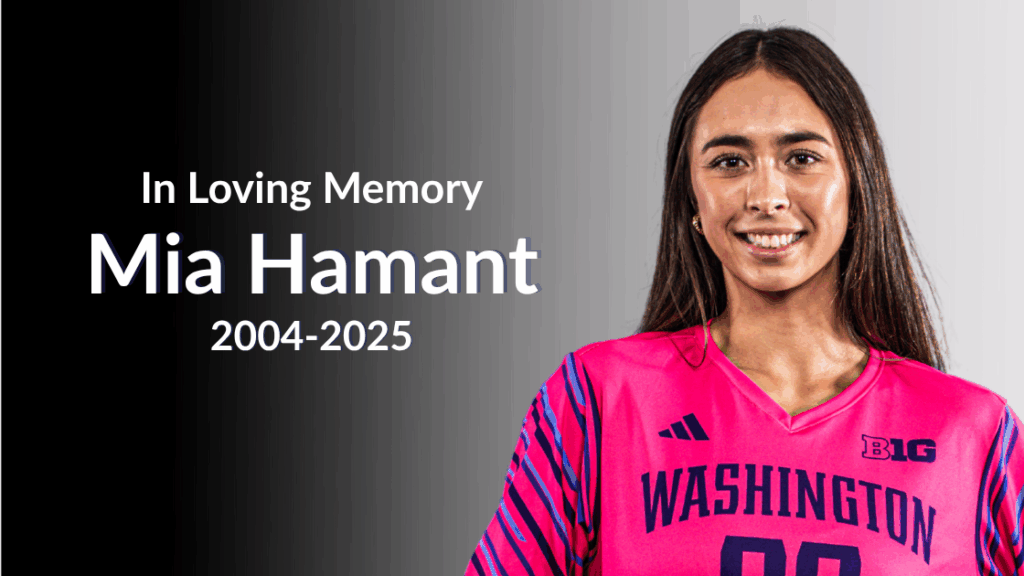
More Kidney Cancer Stories
Mia H., Kidney Cancer (SMARCB1-Deficient Renal Cell Carcinoma, Non-Sickle Cell Trait), Stage 4
Symptoms: Bad cough, fatigue, nausea
Treatments: Chemotherapy, radiation, immunotherapy
...
Alexa D., Kidney Cancer, Stage 1B
Symptoms: Blood in the urine; lower abdominal pain, cramping, back pain on the right side
Treatment: Surgery (radical right nephrectomy)
...
Bill P., Papillary Renal Cell Carcinoma, Stage 3, Type 1
Symptoms: Kidney stone, lower back pain, sore/stiff leg, deep vein thrombosis (DVT) blood clot
Treatment: Nephrectomy (surgical removal of kidney and ureter)
...
Burt R., Pancreatic Neuroendocrine Tumor (pNET) & Kidney Cancer
Symptom: None; found the cancers during CAT scans for internal bleeding due to ulcers
Treatments: Chemotherapy (capecitabine + temozolomide), surgery (distal pancreatectomy, to be scheduled)
...
Sonia B., Kidney Cancer, Stage 1
Symptoms: Fatigue, abdominal discomfort, flank pain, constantly abnormal bloodwork
Treatment: Surgery (partial nephrectomy, ileostomy)
...
